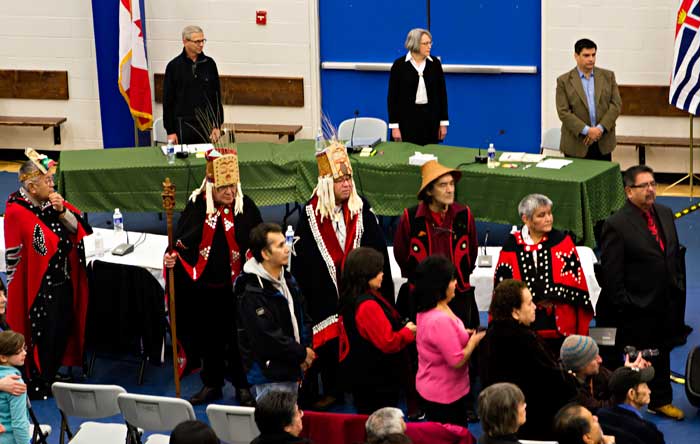
Chiefs of the Haisla Nation were the first witnesses to appear before the Northern Gateway Joint Review panel when the “community hearings” began in Kitamaat Village on Jan. 10, 2012.
The seven, Chief Counsellor Ellis Ross, Jassee chief Samuel Robinson, chiefs Rod Bolton, Ken Hall, Clifford Smith, Marilyn Furlan and Henry Amos spoke eloquently of Haisla traditional knowledge of the region, problems in the past with environmental degradation from local industry and their fears for a future if Northern Gateway pipeline proposed by Enbridge Inc. is approved.
After a welcome ceremony by the Spirit of Kitlope drummers and dancers, the first witness was Samuel Robinson, the Jassee chief of the Haisla Nation and a world renowned carver in wood, silver and gold. Robinson was the first of many First Nations leaders, first the Haisla at the Kitamaat Village hearings and later on Jan. 12 in Terrace the Kitsumkalum to speak of the collapse of the oolichan fishery.
“We have always been taught to take only what we need and to leave the harvest site in the same or better manner, condition, which — when we leave the area. This is a global concern to keep everything clean now,” Robinson said.
Henry Amos voiced his distrust for the government and the Joint Review process. “This is my own personal opinion that we are, the Haisla are already at a disadvantage…. I also know that you’re an independent body, which is good in a way, but what bothers me the most is that you’re appointed, I think from your information it was from the Minister of Environment and the National Energy Board. You’re appointed by the Federal Government and it’s the same government that is telling the world that this project should go ahead. That is my biggest concern right now, is that we are in a disadvantage.”
Chief Counsellor Ellis Ross spoke about the problems with cleaning up a relatively minor diesel spill in Kitimat harbour, “I was working for a charter boat company out of Kitimat, District of Kitimat. And a tugboat down at our dock here sunk, dumping all its diesel into the water…
“Optimal conditions; the water’s calm, you’re working off the dock, you got every gear that you can think of, you can pack it down. We still couldn’t pick that diesel up. In fact, most of it got under the dock and it took a year for it to all leech out, but we spent a couple days down there trying to do what we could, basically mopping it up.
“When we were done with the absorbent pads and booms, the first thing we found out is that, actually, nobody wanted to deal with that product. Our company had an agreement with the pulp and paper mill to burn the product in their furnace, natural gas furnace, so the higher-ups agreed to it, but when we got to the door, their workers refused us. So we were stuck outside the pulp and paper mill with these bags and bags of booms and absorbent pads.
“So they came down with a condition. You guys can burn it in our furnace, but you guys have got to pack it up there yourselves.
“So covered in diesel, soaking wet, stink, and nobody wanted to come near us, we had to do it ourselves. Nobody would touch that.”
Read the Haisla testimony in their own words. Here are links to the unfiltered voices of the chiefs from the transcripts of their testimony:
NOTE: The Haisla First Nation is asking for corrections to the transcripts. When those corrections are received, the pages will be updated.